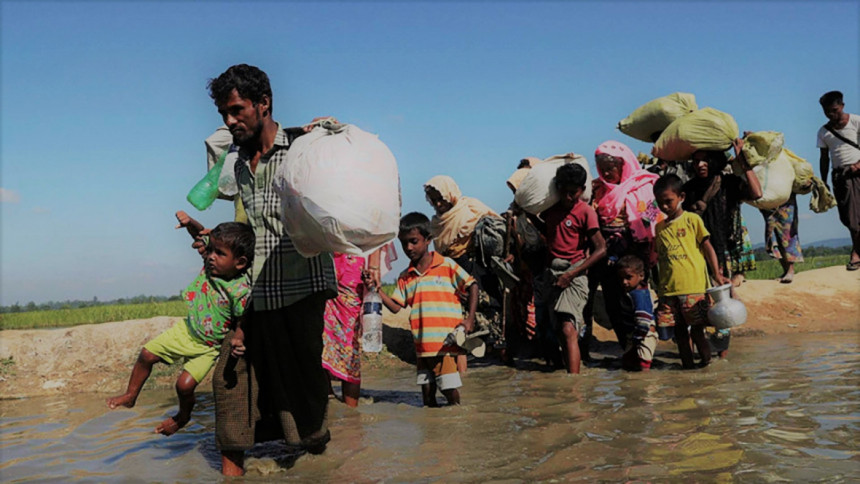Australian security expert writes

Trouble is once more breaking out at the Bangladesh-Myanmar border. Following multiple military incursions by the Myanmar military across the border, the Bangladesh Army is on high alert and is reviewing its options. Regarding Bangladesh’s intentions to begin repatriating Rohingya refugees who are not accepted in their country, both parties are attempting to position themselves.
As this most recent altercation develops, it becomes clear that the Rohingya problem requires a regional solution, writes Dr David Brewster – one of Australia’s leading academic experts on strategy and security in the Indian Ocean region and South Asia – in Lowy Institute’s The Interpreter.
The Tatmadaw, the Myanmar military, has increasingly violated Bangladeshi territory over the past few weeks. This has included helicopter and jet overflights as well as shelling of areas close to Bangladeshi villages. The most recent incident occurred on September 16 and entailed a mortar attack on the refugee camp in “No Man’s Land,” which is located directly on the border between Bangladesh and Myanmar. The narrow border between the two nations has stranded thousands of Rohingya refugees for years. In the incident last week, five people were hurt, including Bangladeshis, and at least one person died.
These events can be considered a spillover from the ongoing separatist struggle in Rakhine State, Myanmar. But Bangladeshi officials privately feel that the Tatmadaw is deliberately attempting to sabotage the border between Myanmar and Bangladesh in order to thwart the planned return of Rohingya refugees to Myanmar. They wonder whether it is merely a coincidence that these episodes took place a few days before Bangladesh Prime Minister Sheikh Hasina’s speech to the UN General Assembly, during which she would ask for support from other countries for Bangladesh’s intentions to repatriate the Rohingyas.
Since 2017, after being ethnically cleansed from Rakhine State by Myanmar government forces and local nationalist groups, about one million Rohingya refugees have sought safety in Bangladesh. As their fate is increasingly in doubt between Bangladesh and Myanmar, a conflict between the two nations is theoretically on the horizon if the issue is not handled, Dr Brewster writes.
With aid from the international community, Bangladesh has established sizable camps close to the Myanmar border as a kind host for the Rohingya refugees. But as financing and attention from abroad dwindle and local Bangladeshi groups grow more hostile to the refugees, the pressure on the Bangladesh government from inside grows. The Bangladesh government must appear to be making serious efforts to repatriate refugees or find other places for them to live since elections are scheduled for the next year.
Early in 2022, Bangladesh and Myanmar resumed talks to repatriate a small number of Rohingyas to that country, with China helping to fund the construction of at least three receiving centres inside Myanmar. The pressure on Myanmar is now being increased by Bangladesh, who is also backing a case brought by the Gambia before the International Court of Justice alleging Myanmar of committing genocide. The UN General Assembly talk Sheikh Hasina gave this week is a part of an effort to keep the Rohingya problem, including their repatriation, in the public eye.
However, there is no reason to think that the Rakhine nationalists or the Myanmar government, who forcibly ejected the Rohingyas, would ever welcome their return. In fact, there has recently been discussion about removing even more of the surviving Rohingyas from Myanmar.
The latest border events are being viewed by the Bangladeshi administration in the context of its efforts to mobilise the international community in support of repatriations. The Tatmadaw’s actions seem designed to elicit a reaction from Bangladesh. Planned repatriations could be stopped and more refugees could leave Myanmar under the cover of an insecure border and the fighting in Rakhine State, Dr Brewster writes.
The only action taken thus far by the Bangladeshi government has been an appeal for calm, with an official saying, “Our Prime Minister never wants violence, we want a peaceful solution.” But challenging issues still exist. Should the Bangladesh Army allow the Tatmadaw to continue its incursions or should it bolster its border fortifications to fend off attacks in order to prevent escalation? Should Bangladesh move forward with its repatriation strategy, which may involve relocating refugees in a conflict area?
Other regional players are also put in a tough position as a result of these developments. A significant amount of humanitarian aid has been sent by many Western nations, including Australia, to support Rohingyas in Bangladesh. There must be a long-term solution, yet there are valid worries about a – voluntary or not – programme of repatriation to Myanmar.
India should be a part of any regional solution that lasts. It has a lot riding on the stability of Bangladesh and preventing China from getting a chance to grow its influence there or in Myanmar, writes Dr Brewster. The treatment of the numerous Rohingya refugees who have made India their home has also grown to be a crucial political issue.
China has aimed to serve as a regional peacemaker in recent years, particularly by assisting Rohingyas’ repatriation. But subsequent developments have undercut this. It appears Beijing has failed to restrain its allies in the Myanmar government or among nationalist organisations in the Rakhine region.
The destiny of the Rohingyas and maintaining peace along the Bangladesh-Myanmar border cannot solely be viewed as a bilateral problem, that much is evident. A significant regional effort will be needed for any long-term solution. Australia has enormous stakes in this issue as well and may play a significant role in collaborating with allies to assist find a political solution, Dr Brewster notes.
Repatriation will ultimately not be a practical solution, regardless of the type of the government in Myanmar. Keeping almost a million people reliant on humanitarian help is also unacceptable. There will be further options to consider. For the interest of all parties involved, this may entail a coordinated regional effort to economically improve Bangladesh’s relatively underdeveloped southern region. Sheikh Hasina might see the chance to transform a humanitarian issue that seems insurmountable into a tale of economic success, the academic expert on strategy and security writes.










